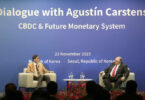Last week, South Korea’s capital city revamped its citizen engagement platform ‘Democracy Seoul’, adding blockchain support to prevent referendum voting fraud.
Launched in 2017, Democracy Seoul has received 5,963 civic proposals, of which 59 became policies in Seoul, reported the Seoul Metropolitan Government’s media channel. The city authorities reorganized the platform to speed up and increase the execution of proposals.
Democracy Seoul enables citizens to propose and debate topics they would like the city government to work on. These debates generally end in a voting process, with the mayor or the local government responding to the proposal. Reducing the threshold of votes needed to initiate public discussions and the mayor’s participation are two other changes made to the platform.
Meanwhile, blockchain will be used to prevent forgery and eliminate the risk of duplicate voting. While exact details were not provided, the report said a name verification system would be used.
Some believe it’s too early to use blockchain for voting, but it depends on the importance of the application. MIT recently made a critical analysis of the Voatz application, which the company said was flawed. Using blockchain for referenda is a lower risk than for national elections.
South Korea has been actively exploring blockchain applications. Last year, Seoul announced plans for blockchain-based citizen services. One of the initiatives was to enable citizens to be identified without having to provide paper documentation.
Previously, Ledger Insights reported on the country’s arms procurement organization “Defense Acquisition Program Administration” (DAPA)’s intention to use blockchain. It said the technology would be used for logging bidding for defense contracts, bid evaluation, and its results.
Another project the government is working on involves tracking the beef supply chain in the country. The country’s meat consumption per capita is larger than China and Japan, two of the biggest beef importing countries in the world.
Meanwhile, blockchain for voting systems is being trailed globally. A few days ago, India’s Election Commission announced it is developing a blockchain solution to enable mobile voting. Swiss city Zug has previously trialed blockchain voting using digital IDs.







